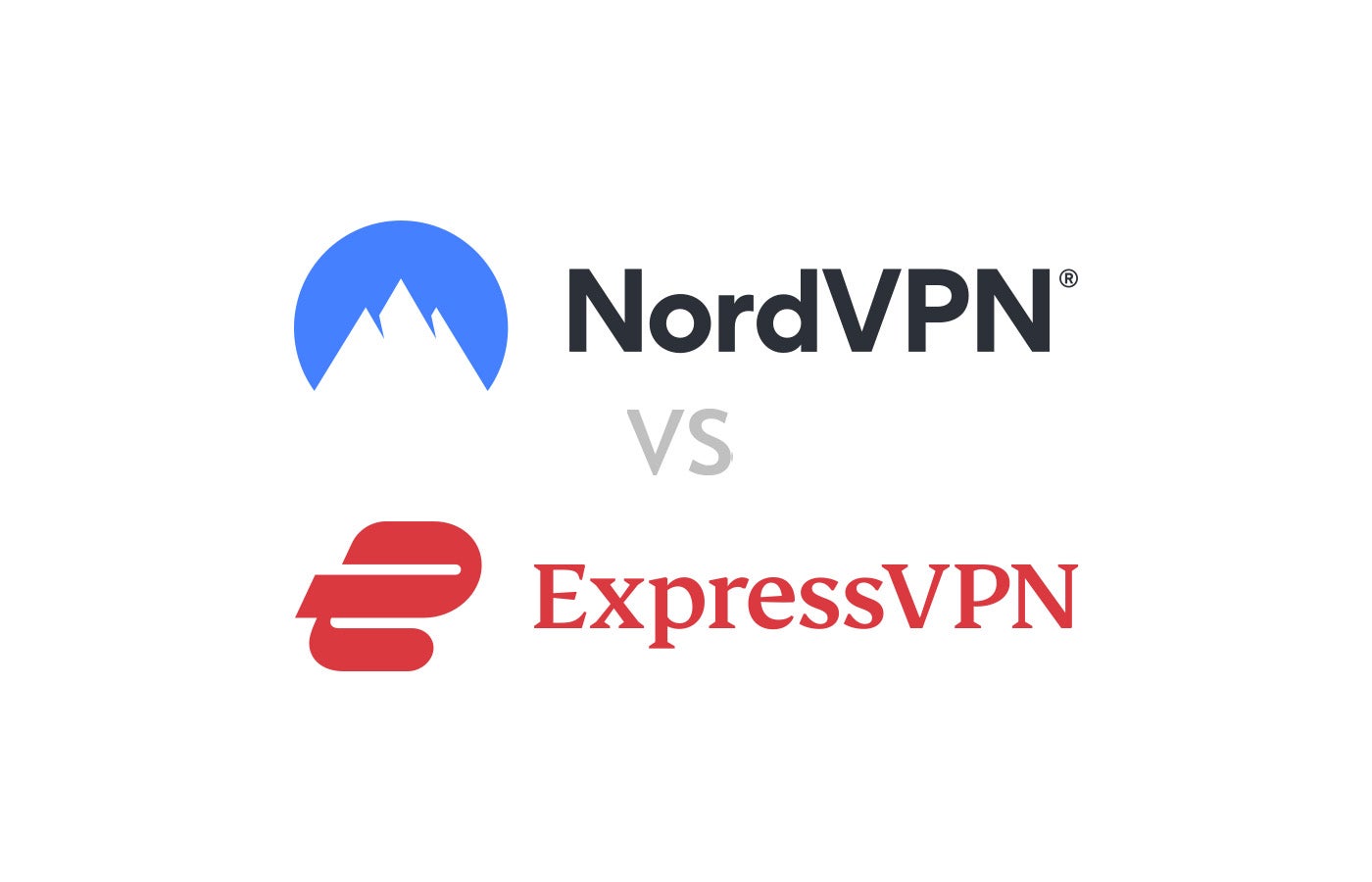
If you try searching for a VPN service, chances are both NordVPN and ExpressVPN come out as top choices. These VPN providers have built their reputation for being some of the best VPN solutions on the market.
NordVPN comes with impressive security features, such as its Meshnet encrypted file-sharing system and threat protection against malware and ads. Meanwhile, ExpressVPN has a clean and easy-to-use user interface and a server network that’s spread across 94 countries.
While both VPNs offer quality features, they have key differences that set them apart. Let’s compare NordVPN vs. ExpressVPN to see how they measure up.
Jump to links:
NordVPN vs. ExpressVPN: Comparison Table
| NordVPN | ExpressVPN | |
|---|---|---|
| Rating | 4.7 stars out of 5 | 4.4 stars out of 5 |
| Security Protocols | OpenVPN, IKEv2/IPsec, NordLynx | OpenVPN, Lightway |
| Server Fleet | 5,800 servers in around 60 countries | Reportedly around 3,000 servers in 94 countries |
| Device connections | Up to 6 simultaneous connections | Up to 8 simultaneous connections |
| Base Price (annual subscription) |
$4.99 per month (NordVPN Standard) | $6.67 per month |
| Standout Features |
|
|
| Visit NordVPN | Visit ExpressVPN |
NordVPN vs ExpressVPN: Security and Privacy
Both NordVPN and ExpressVPN have good reputations in terms of security. They each carry OpenVPN — an industry standard security protocol. NordVPN also has IKEv2, while ExpressVPN only features IKEv2 for its Mac and iOS applications.
In addition, both VPNs have proprietary security protocols. NordVPN has NordLynx — a protocol based on the speed-oriented WireGuard. ExpressVPN has Lightway — its native protocol built for both speed and security. Both products have a built-in kill switch and DNS leak protection; I recorded zero DNS leaks during my testing of each VPN.
While both VPNs have strong security features, they don’t come without concern. In 2019, NordVPN raised concerns when they announced a breach in one of their data centers. Similar concerns rose when ExpressVPN was acquired by Kape Technologies — a company formerly associated with malware and adware.
However, the two services have done their due diligence in building trust and security through third-party testing. The two VPNs have strong no logs policies backed by independent audits. ExpressVPN has a more extensive audit portfolio, with a total of 16 third-party audits on their lineup of apps and services, while NordVPN currently has three.
All in all, both NordVPN and ExpressVPN can be considered secure and trustworthy services this year.
NordVPN vs ExpressVPN: Speed Comparison
NordVPN and ExpressVPN have provided the best speeds among the VPNs I’ve used so far. If I were to choose one, however, NordVPN would be my choice.
With my speed tests, NordVPN had a decrease in speed of only 5.8% for downloads and 16.18% for uploads — really excellent numbers for a VPN. Meanwhile, ExpressVPN recorded very respectable numbers, with a 25.57% drop for downloads and a 27.96% drop for uploads. For this test, at least, NordVPN showed significantly faster overall speeds.
In real-world use, both VPNs provided snappy and quick speeds. I used both servers to do work using Google Workspace apps such as Docs and Drive, having multiple tabs open for research, social media browsing, and streaming 1080p YouTube videos. I didn’t experience any issues with stability or establishing connections for either VPN.
NordVPN and ExpressVPN: Server Locations
NordVPN’s server suite offers over 5,800 servers in around 60 countries. Meanwhile, ExpressVPN has servers spread across 94 countries. While ExpressVPN doesn’t currently state its total server count, it reportedly has around 3,000 servers.
Both servers have server fleets that fall within the middle to upper half of what VPNs usually offer today.
If you want a service with more diversity in terms of countries and locations, ExpressVPN’s 94 countries will be the better pick. However, if you want a network that has as many servers as possible, NordVPN’s network outnumbers ExpressVPN.
NordVPN and ExpressVPN: Pricing
NordVPN has three types of plans you can choose from: Standard, Plus, and Complete. The differentiating factor amongst the three is the inclusion of NordVPN’s other security services.
| NordVPN Standard | NordVPN Plus | NordVPN Complete | |
|---|---|---|---|
| 7-day free trial (on Android only) |
Free | Free | Free |
| 1 year | $4.99/mo | $5.79/mo | $6.99/mo |
| 2 years | $3.79/mo | $4.59/mo | $5.79/mo |
| 1 month | $12.99 | $13.79 | $14.99 |
| Main Features: |
|
|
|
In comparison, ExpressVPN has a more straightforward subscription scheme that’s categorized depending on the duration of the plan.
| ExpressVPN Pricing | ||
|---|---|---|
| Duration | Price | Main Features |
| 1 year | $6.67 per month |
|
| 6 months | $9.99 per month | |
| 1 month | $12.95 per month | |
| 7-day free trial | Free on mobile only | |
ExpressVPN’s pricing is on the more expensive side. However, if you get any of the ExpressVPN plans, you do get access to their password manager called ExpressVPN Keys — at no additional cost.
Both VPNs offer 7-day free trials with small differences. ExpressVPN’s 7-day free trial is only available to use on mobile (iOS and Android.) NordVPN also has a 7-day free trial for Android. However, if you activate your NordVPN free trial account through an Android smartphone, you will be able to use the service on a desktop or other platforms as well.
NordVPN and ExpressVPN both offer 30-day money-back guarantees that will let you refund your initial payment within the 30 days.
If we’re to compare the price of each VPN’s annual plan, NordVPN is the more affordable pick. I also appreciate how NordVPN offers a 2-year subscription that allows for a much cheaper monthly payment. For prospective VPN buyers on a tighter budget, NordVPN offers more choices at more affordable prices for its service.
Feature Comparison: NordVPN vs. ExpressVPN
Server technology
ExpressVPN utilizes its TrustedServer technology where the servers in their network run only on RAM. This means that all data is wiped with every reboot, adding an additional layer of security compared to more traditional server setups that run on hard drives. Servers that operate on hard drives retain data unless they’re purposely erased or written over — a possible security risk that can be exploited.
Figure A

NordVPN also has RAM-only servers but also includes more server types focused on security and privacy. In particular, NordVPN has Double VPN servers that change user IP addresses twice, and obfuscated servers that allow access around network firewalls and restricted content.
Figure B
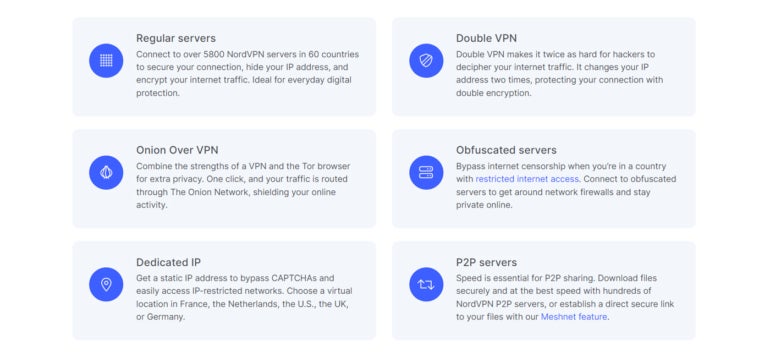
NordVPN also features P2P servers for torrenting, Onion Over VPN servers that route traffic to the secure Onion Network and Dedicated IP servers that can bypass CAPTCHAs and IP-restricted networks.
In terms of server technology, NordVPN offers more security-focused server types that security enthusiasts will find useful.
In-app design and user experience
Both NordVPN and ExpressVPN have applications that run well and provide a good user experience. I had no trouble activating features or switching servers in both of their Windows applications.
Subjectively speaking, I prefer the user interface (UI) and design of the ExpressVPN app.
Figure C
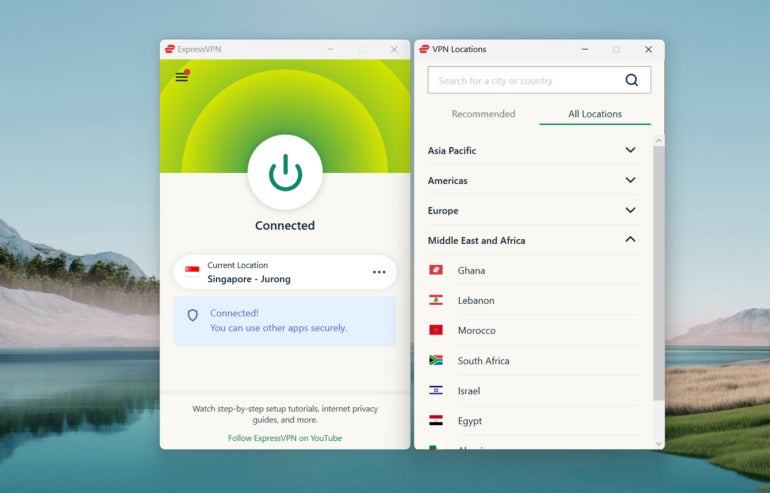
The interface is pleasant in appearance, with each menu or option placed intuitively within the application. Everything looks and feels consistent, enhancing the already smooth experience you get with ExpressVPN.
NordVPN’s Windows application also has a well-designed interface that feels modern and looks feature-packed.
Figure D

I prefer ExpressVPN’s minimal, set-and-forget approach to its overall UI design. But of course, this will be a matter of personal preference.
NordVPN’s Threat Protection vs. ExpressVPN’s Threat Manager
Both VPN services come with built-in protections against malware, ads, and trackers. For NordVPN, there’s Threat Protection, ExpressVPN has Threat Manager. They may sound similar but there is a nuanced difference between the two.
NordVPN’s Threat Protection affords users protection by scanning for malware whenever you download any file off the internet. It also blocks malicious websites, intrusive ads, and trackers. This feature is active even when your machine isn’t connected to a NordVPN server.
Figure E
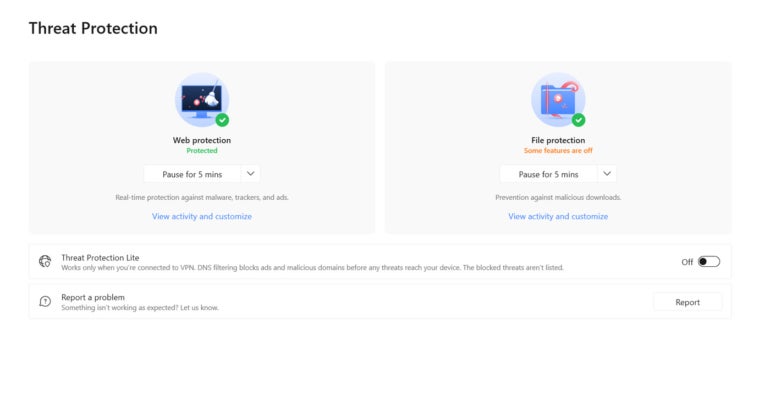
ExpressVPN’s Threat Manager acts as a DNS-based traffic blocker. Its main aim is to prevent any part of your device from communicating with websites and servers that are known to track user data. This malicious data gathering is possible through ExpressVPN’s “blocklist” of malicious sites that they regularly update.
Figure F
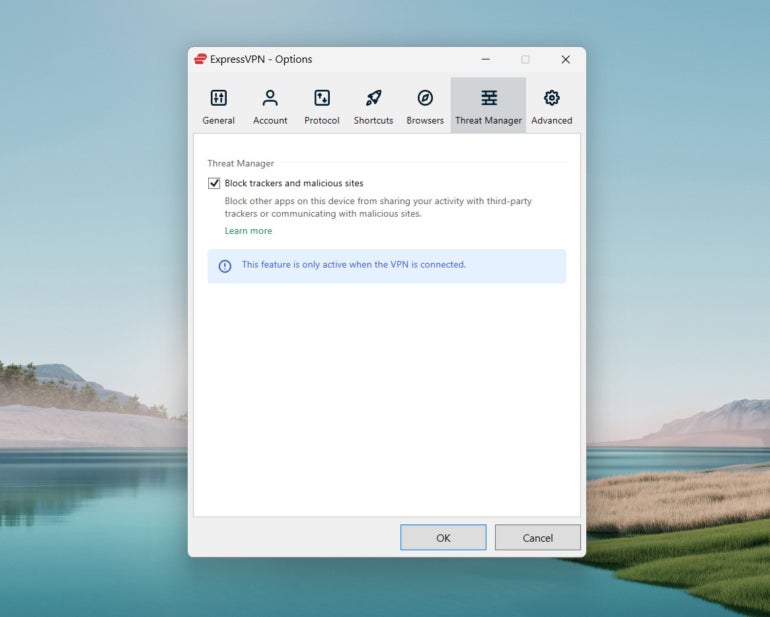
If your needs or workflow include regularly downloading files, NordVPN’s Threat Protection will be the more practical choice. If you’re more concerned with websites tracking your data and don’t necessarily download a ton of files, ExpressVPN’s Threat Manager is the better fit.
NordVPN’s Meshnet vs ExpressVPN Keys
Both VPNs have unique features included in their base subscription. NordVPN has its Meshnet feature — a secure file-sharing system that allows users to share files between multiple devices through an encrypted connection. Meanwhile, ExpressVPN has ExpressVPN Keys — a password manager that comes free with every ExpressVPN subscription.
I was able to test Meshnet on my Windows laptop, and it was able to easily transfer files from my machine to my Android phone with no issue. I wasn’t able to personally test Keys as I already have a separate password manager. However, I do like how Keys allows for unlimited items on unlimited devices, which is very important since user passwords can pile up very quickly.
It’s important to note that NordVPN has its own password manager, NordPass, but you must purchase NordVPN Plus for access. This is opposed to Keys, which comes included with any ExpressVPN subscription.
One can argue that a one-year, NordVPN Plus subscription at $5.79 — that includes NordPass — is still more affordable than the one-year ExpressVPN plan at $6.67 per month.
Value-wise, spending for the NordVPN Plus subscription seems to be the better choice as you get both the Meshnet file system and a password manager for cheaper.
NordVPN pros and cons
Pros
- Offers around 5,800 servers in 60+ countries.
- Threat Protection against malware, ads and trackers.
- Meshnet secure file-sharing system.
- Consistently fast and stable VPN speed.
- Independently audited no-logs policy.
- 7-day trial via the Android app.
Cons
- No free version.
- Has an incident of data breach.
ExpressVPN pros and cons
Pros
- Servers spread across 94 countries.
- Easy-to-use, well-designed app interface.
- Great speeds and performance.
- 16 independent audits for its services, apps.
- Up to 8 simultaneous device connections.
- Includes free password manager.
Cons
- More expensive overall.
- Lacks a 2-year or 3-year subscription.
- Owned by Kape Technologies.
Should your organization use NordVPN or ExpressVPN?
NordVPN and ExpressVPN are two of the most popular and well-regarded VPN services today. They both offer strong security features, great speed and performance, and robust third-party testing.
As an all-around platform, however, NordVPN seems to be the better choice. You get 5,800 servers across 60 countries, an encrypted file-sharing system, threat protection against malware, and server types centered around security — all at a more affordable price. NordVPN also gives users more flexibility in terms of subscription choice based on their desired features and offers a more pocket-friendly 2-year option.
ExpressVPN can still be a great choice if you’re looking for an easy-to-use and well-designed VPN application. There’s an included password manager, and the service allows for up to 8 simultaneous device connections. In addition, if you need a broader spread of countries and locations, ExpressVPN’s server fleet spread across 94 countries may be of better use to you.
NordVPN and ExpressVPN are two of the best VPN services available. No matter which you pick, you will more than likely have a satisfying experience.
Methodology
My comparison of NordVPN and ExpressVPN involved a detailed assessment of their security features, cost, and real-world performance. I had hands-on time with both services on my personal Windows machine.
For speed, I ran both products through Ookla’s Speedtest. As a disclaimer, VPN speeds will vary depending on your internet service provider, your device and your location. To test for DNS leaks, I ran both VPNs multiple times through DNSleaktest.
Lastly, both VPNs were scored on everything from their pricing to their security protocols based on an internal algorithm to get a final rating out of five stars.








